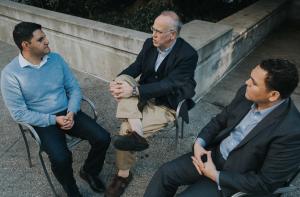In my last blog post, I noted and commented on Jeff Bezos’s dislike of the phrase “work-life balance.” Bezos prefers speaking of “work-life harmony” or “work-life circle.”There isn’t a “strict trade off” between work and life, according to Bezos. Rather, when one has a strong work-life circle then one brings “tremendous energy” both to work and to home.

I don’t like the phrase “work-life balance” either. I agree with Bezos that it’s too simple to think in terms of balance between work and life. But my primary concern isn’t with the limitations of the word balance. Rather, I’m not fond of the basic categories of work and life. These categories, it seems to me, fundamentally misunderstand both work and life. Speaking in terms of work-life balance, harmony, or circle gets it wrong from the very start and perpetuates wrong thinking about work and life.
I had better explain myself, especially since the phrase “work-life balance” is so common and popular these days.
For a basic understanding of work and life, I turn to the Bible. Here I learn to think about work and life in ways that are different from common assumptions and that can greatly enrich our experience of both work and life. In Genesis 1, God is revealed as a worker, as one who works by creating the universe and all its contains. As the final work of creation, God makes human beings in God’s own image. And then God tells them to get to work. More literally, God tells the man and the woman to “Be fruitful and multiply, and fill the earth and subdue it; and have dominion. . .” (Gen 1:28). The second chapter of Genesis shows that God created humankind in order to “till” and “keep” the Garden (Gen 2:15). Thus, if we take seriously the biblical picture of creation, then we must understand that work is not separate from life. We might even say that work is essential to human life, or that work is the primary purpose of human life. In light of Genesis, it makes no sense to speak of work-life balance because work is central to life and life is lived through work.
It’s important to note that when work, in the account of Genesis, is not limited to what we often think counts as work. Work, in the biblical story, is much more than simply what we do for financial compensation. Biblical work is much more than paid work. Most importantly, according to Genesis a vital part of our work includes being fruitful and multiplying in the literal, biological sense. We are to make babies and raise them to become fruitful, working adults. Thus, family is part of our work. To speak of work as separate from family, which Jeff Bezos does, along with all who talk about work-life balance, is to miss a key point about who God created us to be as human beings.
As I think about my life, I understand that my work is essential to my life. And as I think about my work, I understand that my work involves more than being the Executive Director of Fuller’s Max De Pree Center for Leadership, that which I “do for a living.” My work also includes being a husband, a father, a fixer around the house, a worshiper at church, a blogger, an occasional gardener, and much more. Therefore, my challenge isn’t so much to balance my work and my life as it is to discover how best to integrate the different kinds of work I do into a whole life of work, rest, and play.
So, rather than trying to achieve work-life balance, we would be better off if we were to learn to think differently and biblically about our work and our life. Then, we might begin to ask whether or not we are faithfully engaging in all the work God has given us to do, or whether we are giving so much time to one kind of work that we are denying others. We might also ask whether we see our work as essential to our life. And we might consider whether we are living in the rhythm of work and rest that God established from the beginning. This was not a 50-50 balance, by the way, but rather a pattern of six days for work of all kinds and one day for rest (see Gen 2:1-3; Exod 20:8-11).











